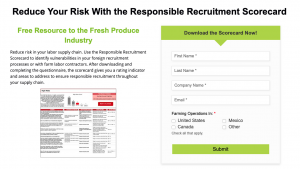PRESS RELEASE
Please direct media inquiries to media@equitablefood.org or 202.524.0540.
WASHINGTON,October 28, 2019 — Equitable Food Initiative has released a free resource to the fresh produce industry to help grower-shippers identify and reduce risk in their foreign recruitment processes and with farm labor contractors.
As the labor shortage in the produce industry intensifies, many growers increasingly rely on recruiters, labor contractors and the H–2A guest worker program for solutions. Despite employment best practices, labor recruitment has blind spots that can put growers at risk. To help avoid the common pitfalls associated with recruitment programs and labor providers, Equitable Food Initiative has created a Responsible Recruitment Scorecard, which is available free on its website in English and Spanish at www.equitablefood.org/scorecard.
 Grower-shippers choose from two versions of a detailed questionnaire—one designed to help identify risks that are often associated with the foreign recruitment of workers and the second to determine risks that can be present when working with farm labor contractors. After filling in the confidential questionnaire, the scorecard provides a rating indicator along with key areas growers can address to drive continuous improvement across their recruitment processes.
Grower-shippers choose from two versions of a detailed questionnaire—one designed to help identify risks that are often associated with the foreign recruitment of workers and the second to determine risks that can be present when working with farm labor contractors. After filling in the confidential questionnaire, the scorecard provides a rating indicator along with key areas growers can address to drive continuous improvement across their recruitment processes.
In 2018, the number of workers admitted to the United States via the H-2A program rose to nearly 243,000, a sweeping 46% increase since 2016. Because labor recruiters play an important role in identifying a potential workforce for many grower operations, workers are vulnerable to exploitation from corrupt recruiters who are involved in labor trafficking and charge illegal recruitment fees. A 2014 Urban Institute study of labor trafficking victim records found that 71% of H-2A and H-2B workers who had been trafficked paid on average $6,150 in illegal recruitment fees. These payments are rarely made to their U.S.-based employers. Rather, they are often made to foreign-based recruitment agencies or farm labor contractors in the form of debt. This debt can then be used to control workers through the threat of violence, resulting in an agricultural labor supply chain where forced labor is endemic.
“These scorecards allow growers to have visibility into what are often invisible risks they take on by using third-party labor providers,” stated Kenton Harmer, director of certification and impact at EFI. “As a self-assessment tool, growers use the results internally to determine which recruiters and farm labor contractors are most aligned with the ethos of their business and to build partnerships that further reduce their vulnerabilities around forced labor.”
The produce industry’s 2018 release of the Ethical Charter on Responsible Labor Practices created an increased demand for social responsibility, called for every farmworker to be treated with dignity and respect and stated that employers must not tolerate modern slavery.
“Responsible recruitment is the right thing to do, and we’ve found that it can also drive business performance,” said Harmer. “Not only does it reduce the legal and commercial risks for the grower but it can also create an environment for meaningful worker collaboration which results in better quality products and increased company efficiencies.”
About EFI
Equitable Food Initiative is a nonprofit certification and skill-building organization that seeks to increase transparency in the food supply chain and improve the lives of farmworkers through a team-based approach to training and continuous improvement practices. EFI brings together growers, farmworkers, retailers and consumers to solve the most pressing issues facing the fresh produce industry. Its unparalleled approach sets standards for labor practices, food safety and pest management while engaging workers at all levels on the farm to produce Responsibly Grown, Farmworker Assured® fruits and vegetables. For more information about Equitable Food Initiative, visit www.equitablefood.org.
View a list of EFI-certified farms.

